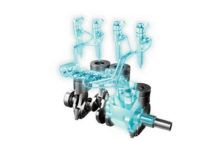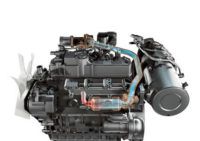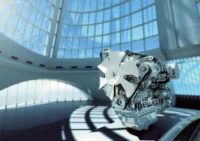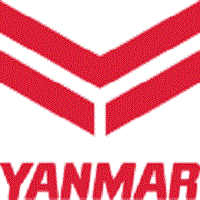With beginnings in Osaka, Japan in 1912, Yanmar was the first ever to succeed in making a compact diesel engine of a practical size in 1933. Moving on, with industrial diesel engines as the cornerstone of the enterprise, Yanmar has continued to expand its product range, services, and expertise to deliver total solutions as an industrial equipment manufacturer. As a provider of small and large engines, agricultural machinery and facilities, construction equipment, energy systems, marine, machine tools, and components - Yanmar's global business operations span seven domains.
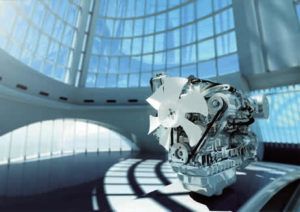
On land, at sea, and in the city, Yanmar’s Mission of “providing sustainable solutions focused on the challenges customers face, in food production and harnessing power, thereby enriching people’s lives for all our tomorrows,” stands testament to Yanmar’s determination to providing us with “A Sustainable Future.” For more information, visit Yanmar Co., Ltd. at its global website at https://www.yanmar.com/global/about/ .
Yanmar's diesel engine philosophy is based on three principles:
1. Environmental responsibility
This is embedded in the Yanmar culture. Our aim is to reduce as far as possible the effect that the manufacture and operation of our engines has on the environment, by focussing on:
- sustainable manufacturing techniques which minimise energy use and which diminish the amount of waste produced.
- the design, development and manufacture of non-road diesel engines with the lowest emissions available on the market.
2. Product quality
Yanmar engines are renowned for their quality and reliability in the field. Equipment manufacturers specially appreciate not existing 0 km problems in their factories and a great reputation of no clogging in the field assured by Yanmar’s DPF technology.
3. Operator friendliness
The operator can be safe in the knowledge that if there is a Yanmar under the engine cover, he will not have any engine problems during operation and will not have to stop for regeneration of the DPF.
This all starts in Yanmar's modern fully automated factory which was constructed in 1995 to the highest environmental standards available, and has been updated as new technology has become available to ensure that its environmental footprint is kept as small as possible.
The investment in state-of-the-art technologies ensures that the engines are produced with the least impact on the environment and have the highest quality to ensure complete reliability in operation.
The latest generation Yanmar engines uses common rail technology with EGR and DPF to ensure that the emissions are as low as possible, even in the USA, where other engine manufacturers accept higher emissions from their engines, using only a DOC. This is not the Yanmar way. The best is just good enough! In fact, the emissions from these engines are so low that exactly these engines will be used in the EU when the strict Stage 5 emissions regulations come into force in 2019. But you don’t have to wait until 2019, they are available now. In fact, over 120,000 Yanmar diesel engines with this technology are already in operation, with no reported problems.
The unique exhaust gas treatment technology that Yanmar has developed for outputs > 19 kW ensures that these engines have the lowest emissions under all operating conditions, the operation of the machines is not affected by the DPF regeneration and the maintenance interval for the DPF is so long at 6000 hours, that it is effectively maintenance free for the life of the machine.
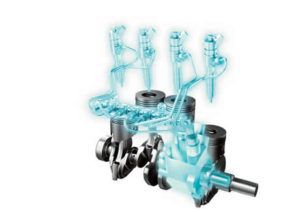
YANMAR TECHNOLOGY
- Common rail technology to create clean burning of the fuel
- Intelligent electronic engine management
- Electronically controlled EGR to reduce NOx and ensure that no excess particulate matter enters the DPF. This reduces the need for regeneration of the DPF, increasing the time between regeneration cycles and the life of the DPF.
- Self-regenerating DPF, controlled by the engine management system, using two modes to reduce the thermal stress on the DPF.
- The first mode is “Assist Regeneration” where the DPF is partially regenerated at a lower temperature.
- The second mode is “Reset Regeneration” where the DPF is completely regenerated at a higher temperature. Because only Yanmar has “Assist Regeneration” this “Reset Regeneration” takes place much less frequently that the normal high temperature regeneration in standard DPF regeneration cycles. The effect of this is to increase the life and reliability of the DPF.
- Reverse compatibility - current Yanmar customers appreciate the reverse compatibility of the new engines, which have the same footprint and many identical interfaces to the engines from previous exhaust emission stages, making for easier installation of the new engines. This also allows then to have only one chassis for countries with differing emissions standards.
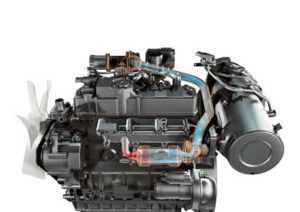
In conclusion, Yanmar offers equipment manufacturers and operators the most reliable, environmentally friendly engines, designed and manufactured to the highest environmental standards.



